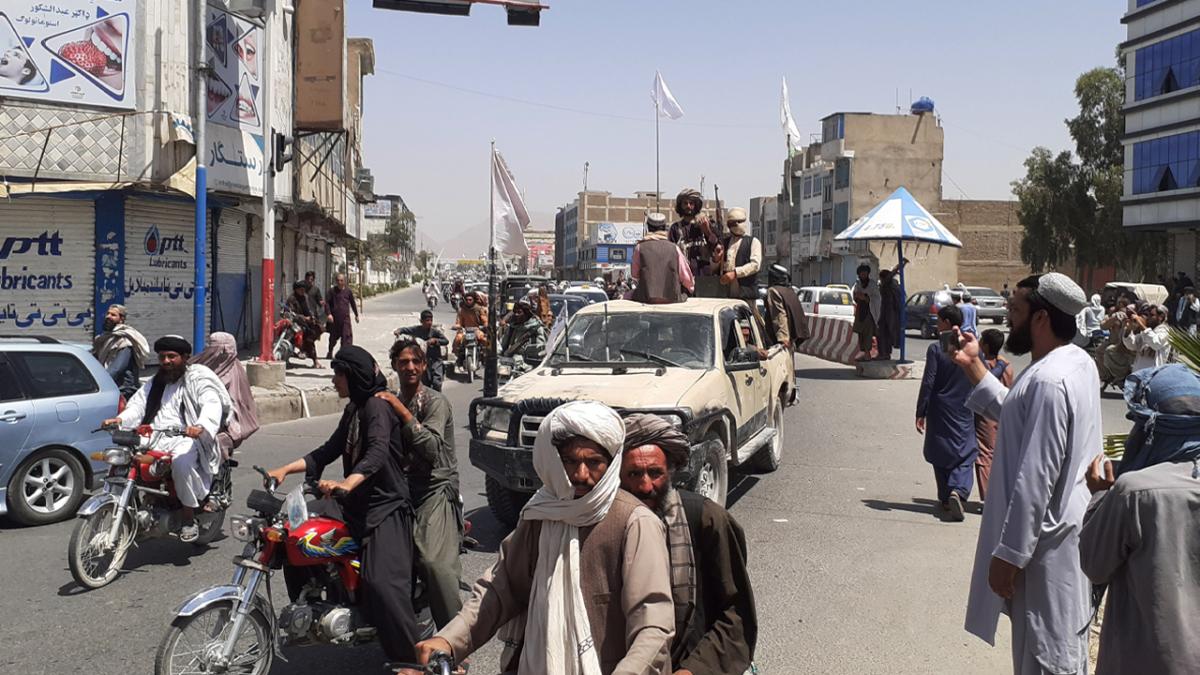
Overnight, the President of Afghanistan Ashraf Ghani fled his country and the Taliban – the militant group which Australia and many other countries have been at war with for over two decades – took control of the capital, Kabul.
The Taliban’s formation of a new transitional government in Kabul could mean an end to over 40 years of counterinsurgency. But it also means that a ruthless group of religious fundamentalists will now impose their beliefs on civilians, including suppressing the rights of women. It’s no surprise that people are attempting to flee the country in droves.
For Afghan interpreters who assisted the Australian Defense Force during the war, all they can do is “wait for death”, as Guardian Australia reports, or hold out until the Australian government potentially evacuates them to safety.
Here’s how we ended up in this tragic situation in the first place.
Armed Taliban fighters have entered Afghanistan’s presidential palace in Kabul hours after President Ashraf Ghani fled the country.
???? LIVE updates: https://t.co/B5EwRybCpq pic.twitter.com/oPIGxxKT1V
— Al Jazeera English (@AJEnglish) August 15, 2021
What’s happening in Afghanistan?
In 2001 coalition led by the US invaded Afghanistan and overthrew the Taliban.
The invasion was justified by the fact that the Taliban had been providing a safe haven for Osama bin Laden and Al-Qaeda, who had just become public enemy No. 1 after the 9/11 attacks.
Since then, war has never really ended in Afghanistan, with forces from the US, Australia and other countries still fighting with the Taliban and other groups like ISIS across the country. There was, however, still an internationally-recognised government which controlled the capital city of Kabul.
Citizens are leaving Afghanistan’s capital #Kabul after #Taliban had announced its takeover of the city.https://t.co/l09sNx2H8y pic.twitter.com/FqpWOo73X8
— Al Arabiya English (@AlArabiya_Eng) August 15, 2021
In February 2020, then-US President Donald Trump signed a peace accord with the Taliban stating that the US would exist Afghanistan if the militants met certain conditions. In April, 2021, President Joe Biden suddenly ordered a complete and unconditional withdrawal of US troops from the country.
Since then, the Taliban has used this opportunity to recapture different parts of the country, starting mainly in the south until they made their way up to Kabul in the north.
The militants didn’t take Kabul by force, instead waiting outside the city for the government to step down so they could take over relatively peacefully.
“Today I was presented with a hard choice,” President Ashraf Ghani wrote on Facebook overnight.
“I should stand to face the armed Taliban who wanted to enter the presidential palace or leave the dear country that I dedicated my life to protecting the past twenty years.”
“If I had stayed, countless countrymen would have been martyred and Kabul city would have been ruined in which case a disaster would have been brought upon this city of five million.”
What is the Taliban?
Taliban literally means “students” in Pashto, the second-most widely spoken language in Afghanistan. Students here means religious students, owing to the group’s ultra-strict interpretation of Islam, however a lot of their beliefs also stem from what they claim is local Pashtun culture.
The group was formed in the 90s amid a civil war between Soviet and US-backed forces. The Taliban sought to kick out invaders, usurp the local warlords, and impose a radical interpretation of Sharia law through violence.
By 1996, they had managed to take over most of the county. For the next five years the group ruled Afghanistan with an iron fist.
Women were forced to wear burqas and banned from going to school or working. People accused of adultery were publicly executed, while people accused of theft had their arms amputated. TVs, music and cinemas were all outlawed.
This reign was brought to an end in 2001 when a coalition led by the US and including Australia invaded Afghanistan.
“Women can have access to education”
Taliban spokesman Suhail Shaheen told the BBC that people in Kabul have no need to worry and their properties and lives are safehttps://t.co/cn9P1Vm8Q2 pic.twitter.com/lgTjsCCr2x
— BBC News (World) (@BBCWorld) August 15, 2021
But even since this invasion, the country has never truly known peace. Not only did conflict between the Taliban and foreign troops continue, but foreign soldiers including those from Australia have been accused of committing serious war crimes against civilians.
In 2012, a branch of the Taliban operating in neighouring Pakistan even tried to assassinate education and women’s rights activist Malala Yousafzai because she dared to go to school as a 15-year-old girl.
Fast forward to 2021 and the Taliban has promised to run Afghanistan more moderately than last time around. But the fact that it’s still unclear whether, for example, young girls will even be allowed to go to school is a pretty grim sign about the state of things to come.
Why are local interpreters in danger?
For many years now, the Taliban has targeted anyone seen as cooperating with the group’s enemies. Now that they’ve taken over the country, the situation is dire.
Raz Mohammad was an Afghan interpreter and cultural advisor to the Australian Army, among other forces, who now lives in Australia.
Five years ago he set up a Change.org petition to evacuate his fellow Afghan interpreters to safety in Australia, and the cause is sadly still as important as ever.
“Some of us were shot, murdered, tortured for helping Australian soldiers and it happened to our families members like siblings and parents as well,” he wrote.
“But we didn’t give up on the ADF. They trusted and depended on us, so I never expected the Australian government to leave hundreds stranded in danger.”
Footage shows people crowding the airport tarmac in Kabul after the Taliban entered the Afghan capital. https://t.co/zyaDykV2Ey pic.twitter.com/esjNeK9nwu
— ABC News (@ABC) August 15, 2021
Many interpreters who worked with Australian forces have been persecuted for years, waiting all this time to be granted some kind of visa to escape to Australia. This is not a new problem for them, but now it’s more urgent than ever.
Mohammad notes that Aussie soldiers were able to return home safely to their families when Australia decided to pull out of the country.
“But I’m terrified for the former ADF interpreters and their families members still trapped in Afghanistan who could be killed because of our affiliation with ADF – unless the government gives them Humanitarian visas to bring them to safety in Australia directly from Afghanistan,” he wrote.
Will the interpreters be evacuated?
The ABC reports that the Australian government is planning on airlifting local contractors who worked for the ADF, including interpreters, whose lives are at risk at the hands of the Taliban.
At at press conference on Sunday afternoon, Prime Minister Scott Morrison didn’t share many details.
“I don’t think it is advisable for me to go into operational arrangements that are being put in place for the security of those we’re seeking to help,” he told reporters.
“What I can assure you is, is this task has the utmost urgency and priority of the government and, of course, has been considered at the highest levels of the government yesterday. And we’re in very constant engagement with our allies and partners as part of that broader effort.”
Meanwhile, speaking on Insiders, the ABC’s political editor Andrew Probyn elaborated with what he knew.
“My understanding is that we are now going to be sending in some RAAF planes with some customs, immigration and foreign service officers to extract hundreds of people, not just interpreters, their families and so on, but the other people who need help,” he said on Sunday.
“What has happened in Afghanistan is a strategic and moral blunder.”
WATCH: @andrewprobyn on the Australian evacuation of Afghan diplomats who have helped our military #Insiders #auspol pic.twitter.com/e4mmgsGArm
— Insiders ABC (@InsidersABC) August 14, 2021
Morrison noted that roughly 400 Afghan contractors who had been employed by the AFD have already been resettled in Australia since April this year.
We’ll have to wait – and hope – that those interpreters and other contractors who are still waiting in Afghanistan will be able to make it here safely.
It’s rare for the state of war for the past 20 years to be preferable anything, really. But in the case of the Taliban, that’s exactly the kind of picture Afghans are painting.



